Managing the quotidian chaos of a capital with a larger population than some European countries requires Olympian ego and zeal, and Mohammed Bagher Ghalibaf, 52, possesses ample doses of both. In his eight years as the mayor of Tehran, the committed moderniser has remoulded the city of 10 million according to his own principles of beauty and utility. He has conjured entire neighbourhoods out of the ground, and dug into private coffers to build highways, bridges and metro tunnels. Along the way, he has subjugated unwieldy terrains, unruly students, intricate bureaucracies – even the forces of nature.
Despite fresh concerns regarding his human rights record, his feats have earned him widespread popularity, but the complex dynamics of Iran's power structure make it unclear whether deploying these strengths will make or break his bid for the presidency.
As the 14 June vote draws near, Ghalibaf is one of eight candidates to pass through the rigid vetting process of the Guardian Council.
Coupled with his impeccable credentials as an Iran-Iraq war veteran and Revolutionary Guard air force commander, the popularity he has garnered by improving Tehran make him a formidable campaign rival for other hardliners handpicked by the supreme leader, Ali Khamenei. Alongside conservatives such as the nuclear negotiator Saeed Jalili and the former foreign minister Ali Velayati, who are seen as Khamenei's favoured candidates, Ghalibaf stands out for his independence and dynamism – characteristics that may in fact harm his chances in the election race.
Known for his affinity for smart suits and leather jackets, the media-savvy mayor appeals to conservatives and technocrats who praise him for his political efficiency, but also to a class of urban voters whom he has attracted with an array of flashy public projects.
Throughout his pursuit of modernity, Ghalibaf has flouted the aesthetic prescriptions of the theocratic elites. His two mayoral terms have seen sweeping public service reforms and budget transparency. He has also erected new cinemas and cultural centres, planted millions of trees, and blanketed the city with some 1,500 parks.
Some compare Ghalibaf to yet another well-liked Tehran mayor, the ardently reformist Gholamhossein Karbaschi, who spearheaded vast green-space projects and neighbourhood revitalisations. As a close ally of the former president Mohammad Khatami, Karbaschi became involved in a power struggle between the reformists and hardliners that led to his arrest and detention from 1998 to 2000.
"Ghalibaf has pursued many popular policies of Karbaschi to build a 'modern urbanity' which structurally contradicts the hardliners' fantasies of an Islamic city," said Asef Bayat, a professor of sociology and Middle East studies at the University of Illinois.
To fund his endeavours, Ghalibaf has developed a talent for finding new cash streams. His crowning infrastructural achievements include the two-level expansion of the Sadr expressway and the six-mile (10km) Niyayesh tunnel that connects two of the city's central highways, as well as the against-the-odds expansion of the Tehran metro. Both projects have been realised in co-operation with Chinese companies.
Speeding up metro construction, in particular, was a snub to Ghalibaf's longtime rival, the president, Mahmoud Ahmadinejad. Himself a former Tehran mayor, the populist Ahmadinejad had been reluctant to dispense money from government agencies to fund the project.
"Ghalibaf remains, ideologically and in terms of his urban policies, somewhere between Karbaschi and Ahmadinejad," said Bayat. "He is someone who has come from an Islamist security-police background and yet wants to avoid the crude, populist Islamism of Ahmadinejad."
In an ideological bureaucracy with immense room for development, it may not be acumen as much as a political opportunity he owes to his hardliner credentials that give Ghalibaf his power to undertake Herculean projects.
"I don't think it's because of his greatness, it is because those who are better haven't been given the chance to flourish," said a former campaigner. "Among many low-quality managers, he is the one who let some technocrats in. There is too much potential in Iran. If anyone can let it out even a little, it makes a splash."
Despite his commitment to civil service, Ghalibaf has a strong military past. Joining Iran's war effort against Iraq at the age of 19, he quickly rose through the ranks to become a general in Iran's Revolutionary Guard Corps (IRGC) by the age of 22. Following the war, he studied geopolitics at Tehran University, and in 1998 became commander of the guard's air force. A year later, when a bloody crackdown on protesting students precipitated nationwide demonstrations and forced the national chief of police to resign, the supreme leader appointed Ghalibaf in his stead.
It was during his time as police chief that Ghalibaf first unleashed his modernising drive. His reform efforts resulted in an overhaul of the force, expensive automobile and equipment upgrades, as well as the implementation of a nationwide emergency hotline. In times of unrest, Ghalibaf presented himself as a placating force between the protesting masses and the baton-wielding authorities. But recently leaked recordings suggest that Ghalibaf's hardline leanings run deeper and darker than he has publicly admitted.
On 16 May, human rights watchers sounded alarm bells following the emergence of a two-hour recording in which Ghalibaf addresses an obstinate group of the Basij, the IRGC's paramilitary wing. The tape, which appears to have been recorded in recent months, shows Ghalibaf taking credit for a series of violent acts of repression, including a passage in which he describes himself "beating [protesters] with wooden sticks" on the back of a motorbike during the 1999 events.
Elsewhere in the recording, he boasts of ordering police to fire gunshots at protesters during on-campus student demonstrations in 2003. He also commends himself for an effective response to the unrest following the disputed 2009 presidential election, which saw widespread killings and abuse of demonstrators.
Throughout his effort to ingratiate himself with the young Basijs, Ghalibaf refers to his career-long commitment to stomping out opposition while defending some of his more moderate decisions. He explains the logistical pragmatism of keeping the metro open during demonstrations, and highlights the impracticality of removing trash cans to prevent their incineration by protesters, pointing out they make a more acceptable target than automobiles.
This moderating streak is evident throughout Ghalibaf's political efforts. In his election campaign, he bills himself as a deft manager who can restore order to the fragmented ruling elite, realign the course of international negotiations regarding Iran's nuclear capabilities, and – most pertinently for voters – rebuild the shattered economy. Despite public outrage at the leaked recordings, the popular mayor has the advertising tools to win over middle-class voters who lack a viable reformist alternative.
"One of the most powerful media organisations in Iran, the [daily newspaper] Hamshahri, is under his supervision," said Arash Ghafouri, a campaign strategist.
"If [Ghalibaf] wants to use the youth to be a part of his election campaign and give energy to it, he has enough money to organise them. And because of his personality, he is the only man in the ruling groups the middle class might trust."
In an election atmosphere where all frontrunners are hardline conservatives close to Khamenei, Ghalibaf's distinct profile as an open-minded modernist may attract reform-minded voters who see him as the only viable option – or, as one Tehran voter put it – a welcome pair of "old shoes in a barren desert".
Though the reliability of Iranian pre-election polls is disputable, current surveys indicate Ghalibaf is in the lead. But the paradoxical nature of Iranian politics means this growing popularity may in fact cost him his chance at the presidency. Given his tribulations with the maverick Ahmadinejad, Khamenei is likely to opt for a candidate who promises to be tractable and obedient. Ghalibaf may thus be pressured to cede his presidential bid for the benefit of the more favoured hardliners Jalili or Velayati.
"Unfortunately, Iran's supreme leader doesn't like strong, independent men … Even in this convoluted political environment, Khamenei might support candidates he thinks follow his wants better than Ghalibaf," said Ghafouri. However, he added that Ghalibaf may end up playing an auxiliary role in a position such as the vice-presidency.
For now, Ghalibaf continues to walk the tightrope between the ultra-conservative ruling powers and his target base of middle-class voters.
Not one to shirk his mayoral responsibilities, he is also pursuing epic public works that tell of the scale of his political ambitions.
To attract tourism and lower Tehran's soaring levels of toxic air, Ghalibaf is building a 220-hectare artificial lake on the outskirts of a city already struggling with water supply. The project, bemoaned by environmentalists, will fill a forested area beneath the Alborz mountain range with around 10m cubic metres of water diverted from a nearby river.
As the first stage of the project inundates the arid landscape, Ghalibaf is pouring his energies into a presidential campaign many say will prove unsuccessful. But given the mayor's resilience, its effects are likely to leave a profound imprint on the Iranian political scene no matter what the outcome.
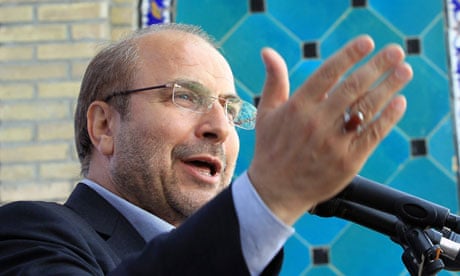
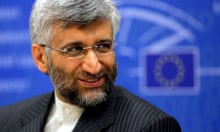
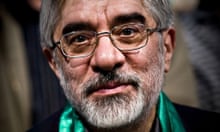
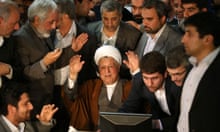
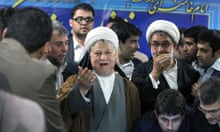
Comments (…)
Sign in or create your Guardian account to join the discussion